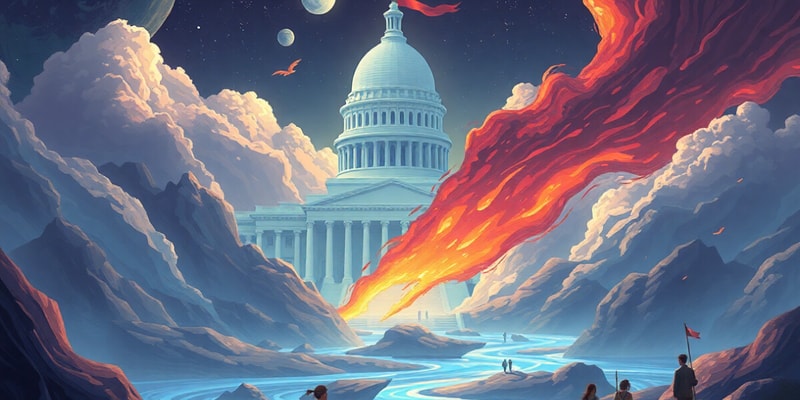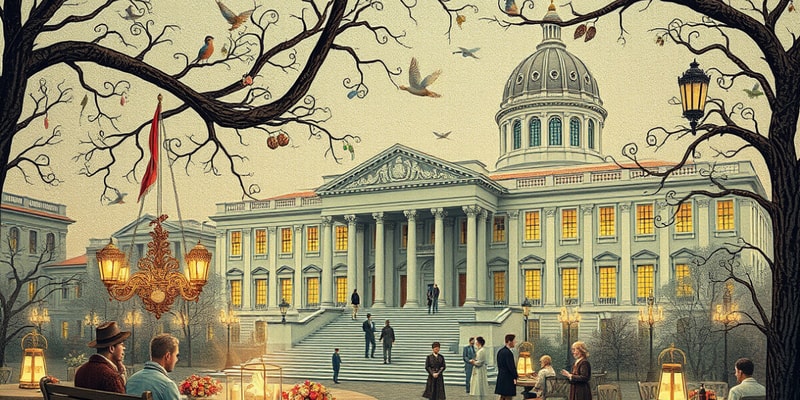Podcast
Questions and Answers
Which of the following best describes 'super-wicked problems'?
Which of the following best describes 'super-wicked problems'?
Trust in institutions is consistently increasing, making policy processes easier.
Trust in institutions is consistently increasing, making policy processes easier.
False
What is the first step in the policy process?
What is the first step in the policy process?
Agenda Setting
Effective policy-making requires clear roles, adequate __________, accountability, and coordination.
Effective policy-making requires clear roles, adequate __________, accountability, and coordination.
Signup and view all the answers
Match the following policy functions with their descriptions:
Match the following policy functions with their descriptions:
Signup and view all the answers
What contributes to the complexity of modern policy problems?
What contributes to the complexity of modern policy problems?
Signup and view all the answers
Civil servants typically possess strong analytical skills when addressing technical challenges.
Civil servants typically possess strong analytical skills when addressing technical challenges.
Signup and view all the answers
Name one type of actor involved in the policy process.
Name one type of actor involved in the policy process.
Signup and view all the answers
What is the primary focus of a meritocratic system in appointments?
What is the primary focus of a meritocratic system in appointments?
Signup and view all the answers
The spoils system promotes autonomy and technical skill in appointments.
The spoils system promotes autonomy and technical skill in appointments.
Signup and view all the answers
What is the main task of political parties regarding electoral campaigns?
What is the main task of political parties regarding electoral campaigns?
Signup and view all the answers
Interest groups pursue specific goals through _____ incentives.
Interest groups pursue specific goals through _____ incentives.
Signup and view all the answers
Match the following functions with their descriptions:
Match the following functions with their descriptions:
Signup and view all the answers
What is a key characteristic of federalism?
What is a key characteristic of federalism?
Signup and view all the answers
Electoral institutions play a crucial role in determining the political influence of policymakers.
Electoral institutions play a crucial role in determining the political influence of policymakers.
Signup and view all the answers
What type of electoral system awards seats in proportion to the votes received?
What type of electoral system awards seats in proportion to the votes received?
Signup and view all the answers
In a __________ system, multiple parties exist without any holding a majority, leading to coalition governments.
In a __________ system, multiple parties exist without any holding a majority, leading to coalition governments.
Signup and view all the answers
Match the following party systems with their characteristics:
Match the following party systems with their characteristics:
Signup and view all the answers
Which electoral system leads to the strongest member winning in a single-member constituency?
Which electoral system leads to the strongest member winning in a single-member constituency?
Signup and view all the answers
Supranational institutions have less power than their member states because they do not delegate sovereignty.
Supranational institutions have less power than their member states because they do not delegate sovereignty.
Signup and view all the answers
Name an example of a supranational institution.
Name an example of a supranational institution.
Signup and view all the answers
What role does social media play in the context of policy-making?
What role does social media play in the context of policy-making?
Signup and view all the answers
Policy communities typically have hierarchical relationships among their members.
Policy communities typically have hierarchical relationships among their members.
Signup and view all the answers
What is one key skill that policy actors must leverage to contribute effectively?
What is one key skill that policy actors must leverage to contribute effectively?
Signup and view all the answers
Members of a policy community are bound by shared core __________.
Members of a policy community are bound by shared core __________.
Signup and view all the answers
Match the type of skill to its description:
Match the type of skill to its description:
Signup and view all the answers
Which of the following is a limitation of policy communities?
Which of the following is a limitation of policy communities?
Signup and view all the answers
Effective policy-making is increasingly necessary due to static economic and social conditions.
Effective policy-making is increasingly necessary due to static economic and social conditions.
Signup and view all the answers
What must a policy community focus on to be effective?
What must a policy community focus on to be effective?
Signup and view all the answers
Policy effectiveness depends on its membership’s __________ and coherence.
Policy effectiveness depends on its membership’s __________ and coherence.
Signup and view all the answers
Which of the following accurately describes a characteristic of relationships within policy communities?
Which of the following accurately describes a characteristic of relationships within policy communities?
Signup and view all the answers
What is the main goal of interest groups when engaging in policy-making?
What is the main goal of interest groups when engaging in policy-making?
Signup and view all the answers
Experts in policymaking are primarily interested in promoting their specific policy goals.
Experts in policymaking are primarily interested in promoting their specific policy goals.
Signup and view all the answers
What term describes the collaborative networks of specialists with policy-relevant knowledge?
What term describes the collaborative networks of specialists with policy-relevant knowledge?
Signup and view all the answers
Interest groups may utilize __________, which involve public campaigns to influence policy indirectly.
Interest groups may utilize __________, which involve public campaigns to influence policy indirectly.
Signup and view all the answers
What is the main objective of the World Trade Organization?
What is the main objective of the World Trade Organization?
Signup and view all the answers
Corporate actors are typically organized in a bottom-up fashion.
Corporate actors are typically organized in a bottom-up fashion.
Signup and view all the answers
Name one mechanism that the World Trade Organization uses to resolve trade disputes.
Name one mechanism that the World Trade Organization uses to resolve trade disputes.
Signup and view all the answers
In parliamentary systems, cabinet members are required to publicly support decisions made by the ________.
In parliamentary systems, cabinet members are required to publicly support decisions made by the ________.
Signup and view all the answers
Match the type of government with its description:
Match the type of government with its description:
Signup and view all the answers
What function does the legislature serve in a political system?
What function does the legislature serve in a political system?
Signup and view all the answers
In presidential systems, the legislature and executive are typically independent and may cause policy conflicts.
In presidential systems, the legislature and executive are typically independent and may cause policy conflicts.
Signup and view all the answers
What is the role of constitutional courts in policy-making?
What is the role of constitutional courts in policy-making?
Signup and view all the answers
Bureaucrats contribute to policy formulation due to their specialized ________.
Bureaucrats contribute to policy formulation due to their specialized ________.
Signup and view all the answers
Which of the following describes 'Ministerial Autonomy'?
Which of the following describes 'Ministerial Autonomy'?
Signup and view all the answers
Study Notes
Introduction: Managing the Policy Process
- Contemporary changes (economic, social, technological) necessitate good policy and governance.
- National, subnational, and international policy processes are crucial, especially when governments address collective problems.
- Effective policies require building institutions and processes for making and implementing them that avoid common errors and replicate success.
Challenge of Governance
- Policy problems are increasingly complex and interconnected.
- Predicting policy effects is challenging due to:
- Interconnectedness of problems
- Involvement of various actors and interests
- Rapid pace of change
- Declining trust in societal, political, and policy institutions.
- Super-wicked problems:
- Require gaining agreement from key actors and the public on policy direction and content (e.g., who gets what).
- Policy actors need to identify other actors, map their interests, assess power dynamics, and compromise.
- Technical and analytical challenges:
- Difficulty in understanding root causes and predicting future effects
- Most civil servants lack necessary skills and analytical competence
Policy Functions and Processes
- Policy design and management need strong frameworks to identify problems, evaluate solutions, implement, and evaluate outcomes.
- Deficiencies in processes hinder government's ability to address policy challenges.
Actors in the Policy Process
- Policy communities involve government, international, and societal actors.
- Government actors include legislators, administrators, and civil servants.
- Societal actors are interest groups, unions, researchers, and experts.
- International actors include advisors and international organization members.
- Effective policy communities are centred on functional sectors, are often informal and horizontal, with durable relationships based on shared values, and comprehensive.
Decision-Making
- Governments make decisions to address policy problems.
- Implementation involves giving form and effect to policies.
- Evaluation assesses the effectiveness to achieve objectives.
Institutions for policy making
- National, and International institutions play a vital role in public policy processes.
- The constitution guides and shapes policy-making.
- Constitution defines centralization of power, principles, and roles of government actors.
- There are multiple forms of government: Unitary, federalism, presidential or parliamentary based.
Electoral Institutions and Party Systems
- Elections legitimize policy-makers and influence political power.
- Different electoral systems (e.g., majoritarian, proportional representation) have differing impacts.
Economic and Social Considerations
- International organizations (e.g., UN) influence public policy through specialized agencies and conventions.
- Member states often face binding constraints from agreements and conventions.
- International trade disputes and policies impact national actors through trade agreements, and trade disputes mechanisms.
Cabinet Formation and Governance
- Cabinet formation can involve one-party or coalition governments with different characteristics (e.g., minimal winning, oversized, minority).
- Presidential systems place emphasis on the executive branch in shaping policy.
Legislative Function
- Legitimacy function facilitates communication between citizens and government; represents citizen preferences.
- Control and oversight functions monitor policies and actions.
- Legislative functions influence policy-making.
Judicial Review
- Constitutional courts can affect policy-making through judicial review.
- Self-limitation by government and corrective revisions are used to make policy more compliant.
Bureaucracy
- Bureaucrats implement policies.
- Specialized bureaucratic knowledge is vital for effective policy execution.
Political Parties
- Core tasks include coordination, electoral campaigns, and structuring competition.
Private Actors
- Interest groups and private actors (corporation and individuals) influence policy discussions by presenting policy suggestions that align with their members' interests.
- Social movements and experts influence policy discussions (unstructured networks of individuals or experts).
Studying That Suits You
Use AI to generate personalized quizzes and flashcards to suit your learning preferences.
Related Documents
Description
Test your understanding of essential concepts in public policy, including super-wicked problems, the policy process, and the roles of various actors. This quiz covers foundational topics such as electoral institutions and the characteristics of federalism, providing a comprehensive overview of public policy dynamics.




